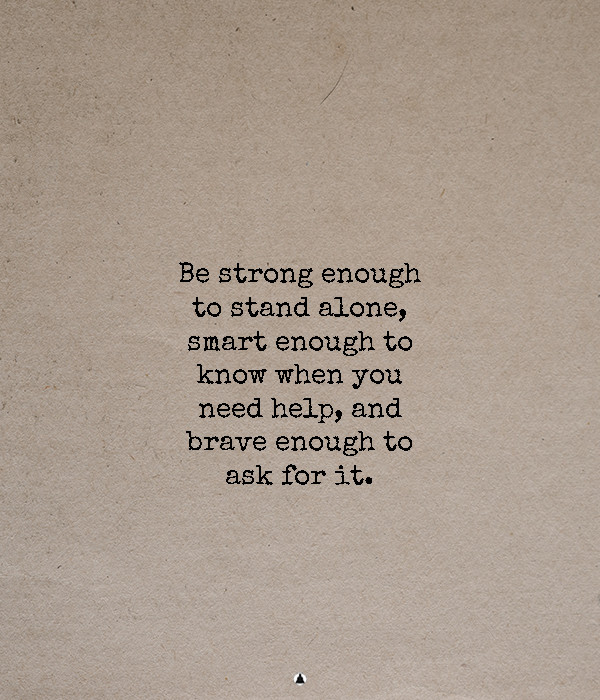I’ve always preferred being self-sufficient. Life has taught me that relying on myself seems much easier and much more efficient. It has always given me the feeling that I am in control. Plus, it helped me allow disappointment.
You know why?
Look around you.
We live in a society that is based on criticism, perfectionism, and shaming.
We are forced to always have our guard in front of us and pretend that we have it all under control. We are raised with the idea that being vulnerable is one of the greatest weaknesses a person can have. The fear of letting people know that we need someone’s help drives us mad. We are afraid of being taken for granted or hurt, so we find it easier to pretend like we don’t feel a thing.
And you have to admit, it takes a great deal of self-awareness and courage to accept the fact that you are struggling and to admit that you need help. What’s even more tragical, since most people never develop sympathy towards themselves, they cannot even imagine that someone else might have those feelings for them. This toxic pattern eventually prevents them from ever asking for help even from the ones we hold the dearest.
There are many expectations and illusions that actually complicate the usual communication between two people. Most of the times, we as women think that if our partner loved us, they would have somehow anticipated our needs or noticed that we are struggling. The fact that they do not, forces us to feel neglected and rejected, convincing us that they are too self-centered to ever care about us.
This is where the real problem lies.
Over so many generations, women have been raised with the idea that they are the ones who have to take care of everything. We’ve always been the ones to attend to the needs of those we depended for survival (apparently men). Add our maternal instincts to that and you get the idea. We’ve always been there, just in case someone needs us, long before anyone ever asks for help. As a result, this pattern that has been adopted by women for centuries have created a big confusion about our role within our partnerships.
There is always a feeling that we must choose between what’s right for us and what is right for them. So, naturally, when we decide to take care of ourselves (ask for help or take the time off), we feel as though we take away something from these people. This toxic thinking is what traps women in the most frightening dynamic of them all: the martyr and the dominator.
And, so most women feel guilty about making time for themselves. In order to balance those emotions of shame, they give their best efforts to tend to everyone’s needs and make everything perfect before they actually focus on themselves. And since there is no such thing as perfection, their own needs never get addressed.
You can guess what this leads to. Silent resentment towards the ones they share their lives with, which make it even harder for these women to ever be open and vulnerable again. A chain reaction that never seems to stop.
The truth is, no one should go through life like this. We shouldn’t have to hold onto these exhausting, traditional dynamics. And we shouldn’t have to pray that someone notices us that we are struggling. What’s more, the people that we share our lives with shouldn’t have to guess our needs. We should learn to put ourselves first on our priority list and communicate with people when we feel tired, afraid, helpless or even desperate.
We are all human and we all require rest, regeneration and help. There is nothing wrong about that. In order to survive and thrive, we must listen to our bodies and focus on taking care of our well beings – even if that means asking for help.
Because asking for help is noting more than caring enough about ourselves to get the support that we need.



